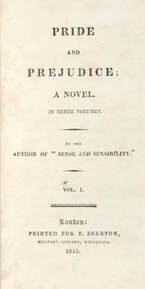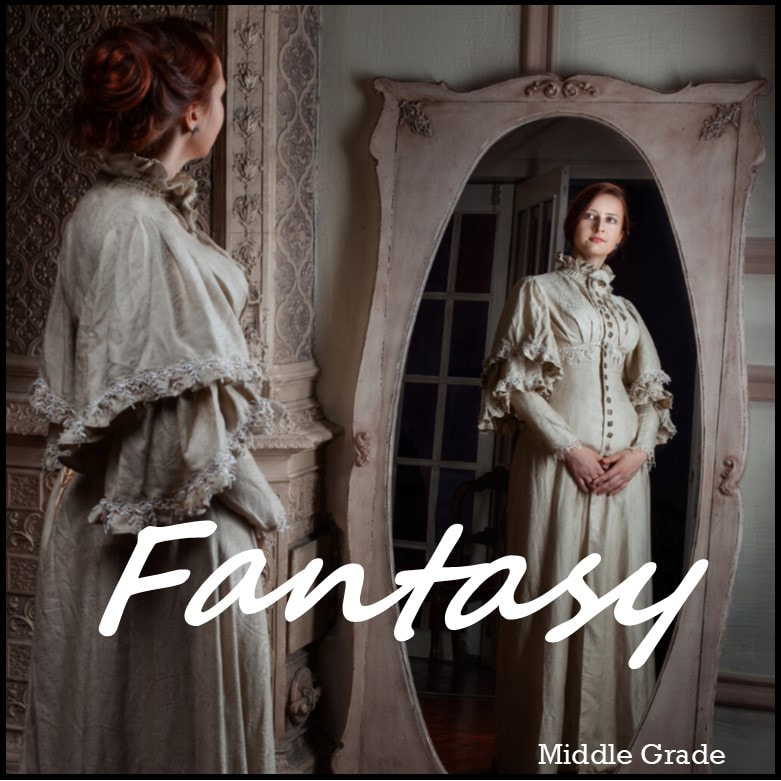
Were you aware that the working title of Pride and Prejudice was First Impressions? It is assumed that this title reflected the immediate dislike of each other by Elizabeth Bennet and Mr. Fitzwilliam Darcy. Unfortunately, another press had just published another book with that same title. As it turns out, the final title has worked out very well!
Pride and Prejudice was published on January 28, 1813. Thomas Egerton, bookseller and publisher, purchased the copyright for £110. Prior to this, her brother, Henry Austen, who was a banker had been circulating the book among circles of friends and acquaintances who could afford to buy books for pleasure-reading. Due to his efforts, the book had developed quite a reputation prior to Egerton’s offer to Miss Austen.
In five months after publication, the book sold over 1,000 copies! A 2nd edition was published that same year and a 3rd in 1817. Considering there was no internet and no social media at the time, that's amazing.
Today, her novel has sold more than 20 million copies! As is often the case, Miss Austen was never recognized with literary awards in her lifetime. Fortunately, her words live on.
For those not familiar with Pride and Prejudice, below is a quick catch-up.
Elizabeth Bennet’s household is all aflutter with the news that a wealthy gentleman named Charles Bingley has rented a nearby manor. There are five unmarried daughters in the Bennet household, and their parents are anxious to see than all married. The Bennets attend a ball where Bingley is not only in attendance, but is quite taken with Jane Bennet. Mr. Fitzwilliam Darcy is not nearly as exuberant over the evening’s festivities and refuses to dance with Elizabeth.
However, subsequent social events finds Mr. Darcy becoming attracted to Elizabeth. When her sister Jane is caught in a downpour on her way to the Bingley mansion, she becomes ill. Elizabeth is forced to travel through inclement weather to tend to her sister. Bingley’s sister is a bit of a shrew, especially when she realizes Darcy is attracted to Elizabeth.
... Continued
Pride and Prejudice was published on January 28, 1813. Thomas Egerton, bookseller and publisher, purchased the copyright for £110. Prior to this, her brother, Henry Austen, who was a banker had been circulating the book among circles of friends and acquaintances who could afford to buy books for pleasure-reading. Due to his efforts, the book had developed quite a reputation prior to Egerton’s offer to Miss Austen.
In five months after publication, the book sold over 1,000 copies! A 2nd edition was published that same year and a 3rd in 1817. Considering there was no internet and no social media at the time, that's amazing.
Today, her novel has sold more than 20 million copies! As is often the case, Miss Austen was never recognized with literary awards in her lifetime. Fortunately, her words live on.
For those not familiar with Pride and Prejudice, below is a quick catch-up.
Elizabeth Bennet’s household is all aflutter with the news that a wealthy gentleman named Charles Bingley has rented a nearby manor. There are five unmarried daughters in the Bennet household, and their parents are anxious to see than all married. The Bennets attend a ball where Bingley is not only in attendance, but is quite taken with Jane Bennet. Mr. Fitzwilliam Darcy is not nearly as exuberant over the evening’s festivities and refuses to dance with Elizabeth.
However, subsequent social events finds Mr. Darcy becoming attracted to Elizabeth. When her sister Jane is caught in a downpour on her way to the Bingley mansion, she becomes ill. Elizabeth is forced to travel through inclement weather to tend to her sister. Bingley’s sister is a bit of a shrew, especially when she realizes Darcy is attracted to Elizabeth.
... Continued
Jane and Elizabeth finally return home, only to find Mr. Collins, a pompous fool and clergyman, who stands to inherit their father’s property according to the law of succession falling only to male heirs. He brazenly extends a proposal of marriage to Elizabeth only shortly after his arrival, only to be turned down., The Bennet girls make acquaintance with military officers stationed nearby, which is when Elizabeth meets Mr. Wickham, He tells her how Darcy had cruelly cheated him out of his inheritance.
Much to Jane’s distress, the Bingleys and Darcy return to London as the winter season arrives. Elizabeth is met with the news that her best friend, Charlotte Lucas, is betrothed to the distasteful Mr. Collins. Her choice is based on age and financial support. Jane visits London to visit friends, hoping to see Charles Bingley, of course. His shrew of a sister visits Jane, behaving very rudely. When Charles doesn’t visit at all, life is bleak for Jane.
In the spring when Elizabeth visits her best friend as she had promised, she calls on Lady de Bourgh, who is the patron of Mr. Collins and the aunt of Mr. Darcy, who shows up while Elizabeth is there. He makes the effort to see her by calling numerous times at the Collins’ household. Out of the blue, he proposes marriage. Instead of accepting, she calls him arrogant and unpleasant and condemns him for stealing Wickham’s inheritance and causing Bingley to distance himself from Jane.
Darcy responds to her accusations in a letter. He had believed Bingley’s romance with Jane was not serious and thus, discouraged Charles. He describes Wickham as a liar, whose hostility toward him is because of the attempt Wickham made to elope with Darcy’s sister.
Upon returning home, Elizabeth is cold to Wickham. However, Lydia has a plan to follow the military officers to their new station. She gains permission to spend the summer in Brighton with an old colonel. In the meantime, Elizabeth joins the Gardiners, who are relatives, on a trip to the North. As fate would have it, they end up near Pemberley, Darcy’s estate. Making sure that Darcy is not in residence, she visits the estate. She is delighted by the building and the grounds. Much to her surprise she learns from the servants that instead of being the man she thought he was, he is a kind and generous master. Naturally, Darcy arrives back home, but he is merely cordial to her with no mention made of her spurning his proposal. The Gardiners and Elizabeth are invited to the estate.
Elizabeth receives a letter from home which informs her Lydia has eloped with Wickham. Now no one can find them. The natural assumption is that they may be living out of wedlock, which would be a terrible disgrace for the family. Returning home a search ensues, but there is no luck until Mr. Gardiner sends word the couple has been found. In addition, Wickham has agreed to marry Lydia in exchange for an annual income. The Bennets, of course, assume Gardiner has paid off Wickham. Elizabeth discovers that Darcy is the benefactor and her family’s salvation.
As the novel moves toward its close, Wickham and Lydia return to Lydia’s home but are treated coldly by her father. They leave for the North of England where Wickham has been assigned. Bingley returns and resumes his courtship of Jane. Darcy arrives at the Bingley mansion and calls on the Bennets often. He still doesn’t allude to his earlier proposal. Bingley, on the other hand proposes to Jane, despite his sister’s feelings. Lady de Bourgh shows up and demands Elizabeth refuse her nephew’s proposal because a Bennet is not suitable. Elizabeth declares she is not engaged, but her spirit won’t allow her to be coerced to do anything her own happiness demands.
In the happily ever after ending, Elizabeth Bennet marries Fitzwilliam Darcy, and Jane Bennet marries Charles Bingley.
Much to Jane’s distress, the Bingleys and Darcy return to London as the winter season arrives. Elizabeth is met with the news that her best friend, Charlotte Lucas, is betrothed to the distasteful Mr. Collins. Her choice is based on age and financial support. Jane visits London to visit friends, hoping to see Charles Bingley, of course. His shrew of a sister visits Jane, behaving very rudely. When Charles doesn’t visit at all, life is bleak for Jane.
In the spring when Elizabeth visits her best friend as she had promised, she calls on Lady de Bourgh, who is the patron of Mr. Collins and the aunt of Mr. Darcy, who shows up while Elizabeth is there. He makes the effort to see her by calling numerous times at the Collins’ household. Out of the blue, he proposes marriage. Instead of accepting, she calls him arrogant and unpleasant and condemns him for stealing Wickham’s inheritance and causing Bingley to distance himself from Jane.
Darcy responds to her accusations in a letter. He had believed Bingley’s romance with Jane was not serious and thus, discouraged Charles. He describes Wickham as a liar, whose hostility toward him is because of the attempt Wickham made to elope with Darcy’s sister.
Upon returning home, Elizabeth is cold to Wickham. However, Lydia has a plan to follow the military officers to their new station. She gains permission to spend the summer in Brighton with an old colonel. In the meantime, Elizabeth joins the Gardiners, who are relatives, on a trip to the North. As fate would have it, they end up near Pemberley, Darcy’s estate. Making sure that Darcy is not in residence, she visits the estate. She is delighted by the building and the grounds. Much to her surprise she learns from the servants that instead of being the man she thought he was, he is a kind and generous master. Naturally, Darcy arrives back home, but he is merely cordial to her with no mention made of her spurning his proposal. The Gardiners and Elizabeth are invited to the estate.
Elizabeth receives a letter from home which informs her Lydia has eloped with Wickham. Now no one can find them. The natural assumption is that they may be living out of wedlock, which would be a terrible disgrace for the family. Returning home a search ensues, but there is no luck until Mr. Gardiner sends word the couple has been found. In addition, Wickham has agreed to marry Lydia in exchange for an annual income. The Bennets, of course, assume Gardiner has paid off Wickham. Elizabeth discovers that Darcy is the benefactor and her family’s salvation.
As the novel moves toward its close, Wickham and Lydia return to Lydia’s home but are treated coldly by her father. They leave for the North of England where Wickham has been assigned. Bingley returns and resumes his courtship of Jane. Darcy arrives at the Bingley mansion and calls on the Bennets often. He still doesn’t allude to his earlier proposal. Bingley, on the other hand proposes to Jane, despite his sister’s feelings. Lady de Bourgh shows up and demands Elizabeth refuse her nephew’s proposal because a Bennet is not suitable. Elizabeth declares she is not engaged, but her spirit won’t allow her to be coerced to do anything her own happiness demands.
In the happily ever after ending, Elizabeth Bennet marries Fitzwilliam Darcy, and Jane Bennet marries Charles Bingley.









 RSS Feed
RSS Feed